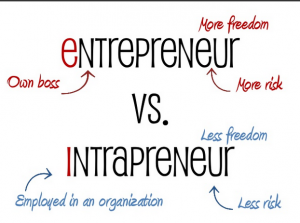At some point in their careers, most, if not all engineers, will move to positions of technical or engineering leadership. That ranges from becoming a leader of a project team to a leader of an entire technical enterprise. Or simply taking responsibility of the own career. Take the example of tenure trackers at university, who not only have to do excellent research but all of a sudden have to take on a role as an entrepreneur to secure their own employment by the acquisition of new projects by writing proposals. Should not we pay more attention to entrepreneurial education in our engineering programmes?
Entrepreneurial education
When I start discussing entrepreneurial education the confusion is almost immediate. As soon as a colleague hears a word that sounds like “entrepreneur”, he or she stops thinking and has already made up his or her mind. It must be about monetisation of scientific research, creating spin-offs, partnering with industries, and learning about self-employment. No, they say, we shall not encourage all students to start up their own company, educate them in business development, self-employment, venture creation and growth, i.e. “how to become an entrepreneur”. I agree, this may be relevant for only a minority of our students, but much more important is the following for all engineering students:

Entrepreneurial behaviour top 50 words (Source: Slideshare)
Making students more creative, opportunity-oriented, self-reliant, initiative taking, action-oriented, innovative. These attributes are relevant to all walks in life of the engineer. They are related to personal development and entrepreneurial thinking. I use the catch-all “entrepreneurial behaviour” for it. The calls for its inclusion in higher engineering education are numerous.
A first example I found in a recent blog post of Richard Branson, the CEO of Virgin. It addresses why universities in higher engineering education should teach to be entrepreneurial. “These universities aim to make their students more employable in the modern world. For them to truly be able to do this, it’s vital that they allow and support students to be more entrepreneurial. Having (engineering) qualifications does matter, but being able to back them up with real-life experience is much more valuable when it comes to succeeding in business. Many companies, including Virgin, look to hire entrepreneurial people as they are great at turning challenges into opportunities and driving innovation.”
Another call I read in the recently published book “Higher Education in 2040, a Global Approach” by prof. Bert van der Zwaan. He states that academic staff on the shop floor needs stronger entrepreneurial thinking and acting skills than they master today. These skills are urgently needed to find and seize the opportunities in nowadays’ academic context of declining research funds, increasing student numbers, distrust and a position in society that is less clear than it has ever been.
Most recently I heard the call for the inclusion of entrepreneurial behaviour in education last week. I attended the European Convention of Engineering Deans /University Leaders Dialogue (ECED/ULD), organised by CESAER and SEFI in Munich 3-4 April 2017. The meeting was concluded by 15 “Munich Statements”. One of them was about the urgent need to include training of an entrepreneurial mindset for all students in higher engineering education. The engineering deans agreed that this mindset is essential for more innovativeness and successful career paths of young graduates in engineering and other domains.
Entrepreneurship versus Intrapreneurship

Original source: http://www.slideshare.net
A recent publication of the World Economic Forum discusses the rise of intrapreneurship in the world of work. It involves workers formulating and implementing new ideas within organizations, rather than starting their own businesses. In today’s engineering business the employer expects that each employee spots trends and opportunities for innovation in engineering and technology, and has network skills. The so-called Entrepreneurial Employee Activity (EEA) has become a key performance indicator in engineering business. The WEF article states that entrepreneurial individuals in Europe increasingly choose to start new ventures or innovative projects while working for their employers rather than start their own business. “In Europe, a greater proportion of entrepreneurship is expressed as EEA than anywhere else in the world: 40% of entrepreneurial individuals are EEA entrepreneurs, compared with 29% in the United States”. When we add up the number of people engaged in start-ups, as the real entrepreneurs, and EEA into the mix, then Europe comes after only the US, Canada and Australia”. This underlines the importance of the mastery of entrepreneurial behaviour at graduation of an engineering study.
The common denominator is that all engineering students should acquire their ability and willingness to create value for other people. Creating value for other people is the most fundamental driver for the development of products, systems and processes in engineering and technology!
“Education at technical universities focuses on the mastery of fundamentals of maths and science, abstract engineering concepts and theories without addressing its relevance and relationship with the context of engineering practice and design. Young graduates are hard workers and performers, but have not learnt that in practice good can be good enough. They often come up with elegant gold rimmed solutions that miss any sense of value creation”.
– CEO of a Dutch global market leader for value-added logistic process automation; more than 4000 technical employees
Entrepreneurial behaviour develops into a key asset
At the TU Delft Education Day 14 December 2016 the plenary session explored the role and position of entrepreneurial behaviour in our education. About 26% of those present voted “No, this behaviour can be learnt on the job or in extracurricular activities”. And 74% of the attendees voted for the proposition “Yes, Entrepreneurial Behaviour will develop into a key asset of our engineers in future”; 47 % of these Yes-voters preferred to accommodate the learning of entrepreneurial behaviour in the programmes, but leave the choice to the students. 27% concurred with the statement “Yes, Entrepreneurial Behaviour will be a key asset for all our engineers. It should therefore constitute a core component of the overall engineering education, just as physics, mathematics and ethics are.” However, the range of opinions over the university is wide. A recent survey among academic staff in my Aerospace Engineering faculty reveals that only 23% is in favour of incorporating some entrepreneurial education in the Master’s.
I firmly believe that good employability in a future which is full of digitalisation, mass robotisation and emerging artificial intelligence, will require strong entrepreneurial behaviour with a good awareness of the bigger picture including strategic goals and trends in technology and society, customer desires and competitive threats. Employers expect their employees to have the capability to act like leaders by creating value through cost-reducing and revenue-increasing innovations, by taking initiative, by being self-reliant, creative, innovative, risk taking and agile, by decision making and sensemaking. All our graduates will end up as an intrapreneur at their employer or as an entrepreneur in their own start-up.
“Virgin could never have grown into the group of more than 200 companies it is now, were it not for a steady stream of intrapreneurs who looked for and developed opportunities, often leading efforts that went against the grain.”
– Richard Branson
Richard Branson states in his blog “Entrepreneurship is more popular than ever. Students shouldn’t be forced to choose between gaining experience or going to university – the two can be combined (…) I see the value of university as an incubator for entrepreneurial talents and partnerships.” He therefore advises students to enroll in a Master degree programme only if it supports them to acquire entrepreneurial behaviour.
We should take this seriously and integrate the teaching of this behaviour in our Master curricula on top of the things we’ve always done, such as the deep working knowledge in a disciplinary field, rational problem solving, etcetera.
Entrepreneurial behaviour no longer in the margin of a Master curriculum or as an extra-curricular course for the happy few, but as an integrated competence development pathway for all.
Integrating this competence in disciplinary content
I am happy to see that entrepreneurs, recruiters in engineering business, engineering deans, and many faculty staff at the TU Delft Education Day are aware of the increasing importance of entrepreneurial behaviour for our engineers. But making the change is a barrier. How do we move on from discussing these skills to integrating them in our curricula as a necessary part of the formation of an effective engineer? Do we know how to do it? Is our academic staff, recruited for academic excellence and research, equipped for the scholarship of teaching and learning this behaviour? Or should we train students to give instruction to their peers about this important skill?
I don’t have all the answers but have a strong preference to stay away from extra courses. I highly prefer to apply the CDIO approach by integrating and embedding the learning and teaching of this entrepreneurial behaviour in already existing courses and research or design projects, and applying an active learning-by-doing approach.
Interesting information is available from National Centre for Entrepreneurship in Education (NCEE). It supports higher education to build its entrepreneurial future.



